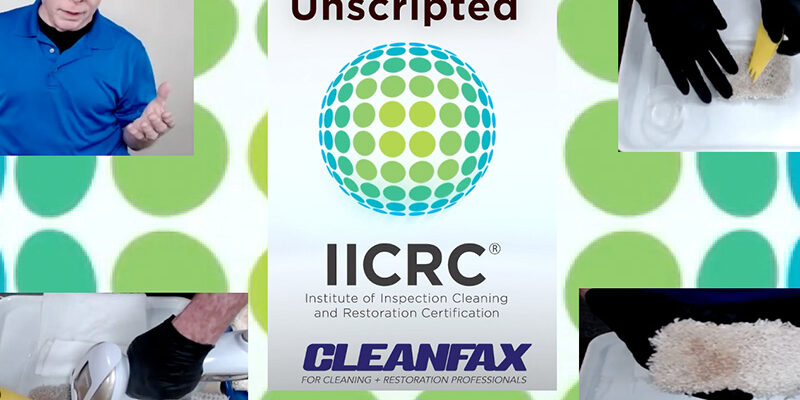Driver Education

In most trade industries, and especially within restoration and cleaning, there is a significant amount of training geared toward helping new frontline hires gain the technical skills necessary to perform the work they’ve been hired to do. This technical training is fundamental to the success of just about any company in any industry.
In addition to classroom instruction, training frequently involves having the new employee work alongside an assigned “trainer” until they’ve acquired sufficient skills to work unsupervised. In smaller organizations, this trainer might be the owner, while in larger ones, it’s frequently another technically competent and trusted frontline worker.
All this training is good! After all, what customer wants to hire a plumber who doesn’t know how to fix a broken pipe, an electrician who can’t safely install an outlet, or a carpet cleaner who thinks it’s a good idea to use bleach to lighten a soiled traffic lane?
The challenge many small businesses encounter is becoming victims of their own success. With an increased workforce to handle growth, many then find themselves needing to hire or promote people into supervisory positions.
The part that frequently gets overlooked with technical training is that while it provides new employees with excellent instruction on performing a particular task, it does little to prepare them for advancement beyond a frontline worker role. While this has an obvious downside for the employee who wants to move up in the company, it can have an even more significant impact on small businesses when an employee falls short in their new supervisory or management role.
Too often, we don’t invest the same effort and money into developing the people who will drive the performance of the frontline staff or those who may ultimately be driving the company. While a two- or three-day workshop and lots of on-the-job experience may be sufficient to keep technical skills sharp, this is rarely the case regarding management or supervisory competence.
Becoming proficient in these roles requires not only learning new skills but, frequently, a change is needed in our behavior and our thinking about these roles. Unfortunately, this is where many entrepreneurs struggle with the rigors of training managers and supervisors for several reasons.
- Entrepreneurs are usually not good managers themselves, so it can be difficult for us to recognize the characteristics of a good manager.
- Entrepreneurs are usually not good trainers. Oh, sure, some of us can do this once. But the impatient, easily distracted, and easily bored characteristics that make us promising entrepreneurs usually get in the way of our being effective trainers.
- We promote the wrong people into management or supervisory positions. People who are like us, or family members, or our best frontline workers — not necessarily someone who possesses the skills or desire to manage others.
- We don’t give new managers adequate time to develop their management skills. Just as with technical skills, people usually get better with practice.
Developing as a supervisor or manager demands a different set of skills than performing technical work. Soft skills such as communication, listening, empathy, and coaching play a more significant role in whether or not a person will succeed. This requires a different approach to training — one more about coaching than simply performing a task.
When we discuss hiring a frontline worker, how often do we comment that we’d rather hire someone with little or no experience? We don’t want to have to break bad habits that someone with previous experience might bring to the job.
A similar principle holds true for someone moving into a management or supervisory position — or even someone we’re promoting from within the company. Without structured training in managing people, most of us learn how to manage from our previous managers. If those experiences were positive, we’re more likely to have a good foundation and model those behaviors. If our experiences weren’t positive, those are the lessons and behaviors we’ll bring to our new position.
As business leaders, we can do a lot to set new managers up to succeed by following a few simple guidelines.
1 | Start early. Stay late. Most of us consider hiring or promoting a manager after we’ve already stacked the deck against ourselves. Not only does it take longer for a new hire to become familiar with a new company or for someone who’s been promoted from within to adjust to their new role, but it takes longer for us to adjust to having someone now doing what we once did. We need to be prepared to stick with it. If this person turns out to be a better manager than we were (which should be the case and usually isn’t hard to do), then we have a whole different emotional challenge to address. If this is the case, see the last point below.
2 | Embrace the struggle. As author Ryan Holiday writes, “When we aim high, pressure and stress obligingly come along for the ride.” It wasn’t easy starting a business. What makes you think it will be any easier growing it? All growth, whether personal or professional, involves risk and sacrifice. Developing our people is no different.
3 | Delegate. Don’t abdicate. Too often, when we give responsibility to a new manager, we don’t follow up on their performance. Instead, we just assume they know how to manage. Or, when they’re getting the results we want, we don’t look further to see how they’re bringing those results. The how is just as important as the results. Short-term performance driven by fear, intimidation, or luck won’t last and is damaging.
4 | Get out of your own way. This one’s hard because we usually don’t see how we’re standing in our own way. It starts when we avoid hiring the right people out of fear, ignorance, or jealousy. It continues when we don’t get managers the training they need to become even better managers. And it can end up when we overstep our bounds and meddle in the things we’re paying them to do.
When we consider the critical role managers play in driving the success of our company, now and in the future, it only makes sense that we provide them with the best driver education available. Both their safety and our future depend on it.












